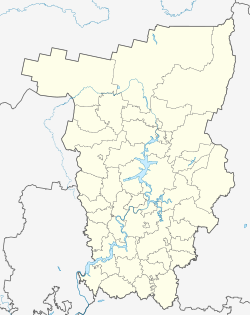Perm
| Perm (English) Пермь (Russian) Перем (Komi-Permyak) |
|
|---|---|
| - City - | |
 View of Perm |
|
 Location of Perm Krai in Russia |
|
|
|
|
|
|
|
|
|
|
| City Day | June 12 |
| Administrative status (as of December 2011) | |
| Country | Russia |
| Federal subject | Perm Krai |
| Administratively subordinated to | city of krai significance of Perm |
| Administrative center of | Perm Krai,Permsky District, city of krai significance of Perm |
| Municipal status (as of August 2012) | |
| Urban okrug | Perm Urban Okrug |
| Administrative center of | Perm Urban Okrug, Permsky Municipal District |
| Mayor | Dmitry Samoylov |
| Representative body | City Duma |
| Statistics | |
| Area | 799.68 km2 (308.76 sq mi) |
| Population (2010 Census) | 991,162 inhabitants |
| - Rank in 2010 | 13th |
| Density | 1,239/km2 (3,210/sq mi) |
| Time zone | YEKT (UTC+05:00) |
| Founded | May 15, 1723 |
| City status since | October 29, 1781 |
| Previous names |
Yagoshikha (Yegoshikha) (until 1781), Perm (until 1940), Molotov (until October 2, 1957) |
| Postal code(s) | 614xxx |
| Dialing code(s) | +7 342 |
|
|
|
| on | |
Perm (Russian: Пермь; IPA: [pʲɛrmʲ];) is a city and the administrative center of Perm Krai, Russia, located on the banks of the Kama River in the European part of Russia near the Ural Mountains.
According to the 2010 Census, Perm's population is 991,162, down from 1,001,653 recorded in the 2002 Census and 1,090,944 recorded in 1989 Census. As of the 2010 Census, the city was the thirteenth most populous in Russia.
From 1940 to 1957 it was named Molotov (Russian: Мо́лотов [ˈmolətəf]).
The name Perm is of finno-ugric etymology, likely of Uralic (Komi or Veps) origin. Komi (Komi-Permyak: Перем, Perem; Komi: Перым, Perym) is a member of the Permic group of Fenno-Ugriche Uralic languages, which is also named for Perm. In Finnish or Vepsian language "Perämaa", means "Far away Land", and the Hungarian word perem means "edge", "verge". The geologic period of the Permian takes its name from the toponym.
...
Wikipedia



